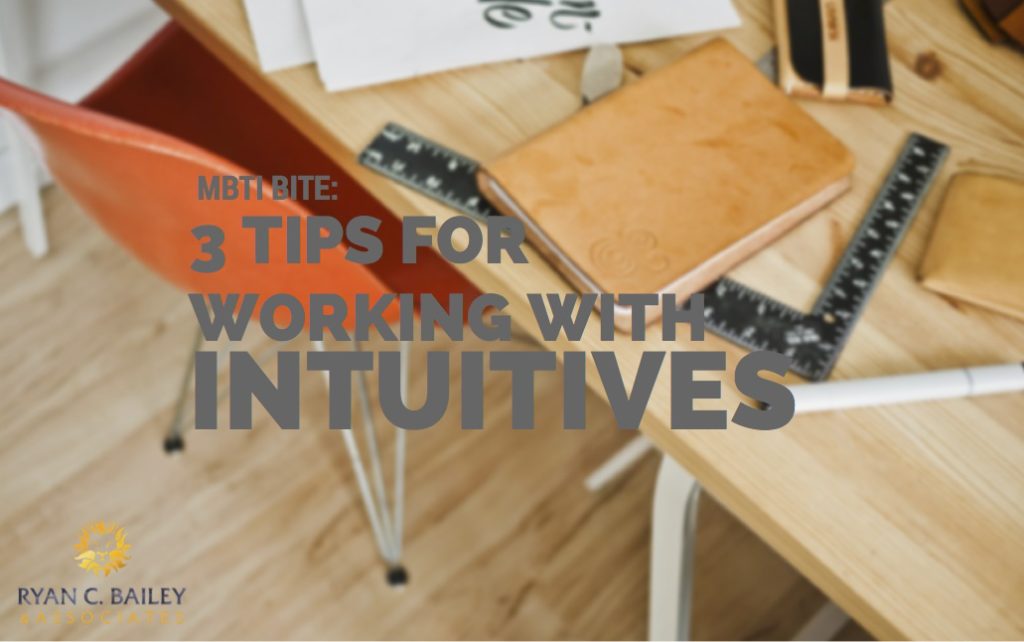 You know us iNtuitives.... We are your big picture, forward-looking, imaginative members of the work team. When a detail-oriented person (S on Myers-Briggs) is going through the facts of a situation, the N is disinterested and unimpressed. We will be among the first to pick up our phones to check for texts and emails.
No, we don’t have ADD. It is just that as we iNtuitives hear the facts, we search for the meaning behind them rather than focus on the facts themselves. Then, when as little as 30% or so of the facts are out, we will see a pattern and “lock and load” on it.
You know us iNtuitives.... We are your big picture, forward-looking, imaginative members of the work team. When a detail-oriented person (S on Myers-Briggs) is going through the facts of a situation, the N is disinterested and unimpressed. We will be among the first to pick up our phones to check for texts and emails.
No, we don’t have ADD. It is just that as we iNtuitives hear the facts, we search for the meaning behind them rather than focus on the facts themselves. Then, when as little as 30% or so of the facts are out, we will see a pattern and “lock and load” on it.
Intuitives are often described as theorists or dreamers. We live in the future. We love innovation and are drawn towards shiny new things (well, maybe we do have ADD.... just kidding).
We also like fuzzy facts and guessing the meaning behind those fuzzy facts.
You can spot us by the metaphors we use (see “lock and load” above).
Since iNtuitives make up only 27% of the population (vs. 73% for their opposite Sensor types), it would be easy to underutilize the gifts that iNtuitives bring to a meeting or project.
Here are three tips that can help you work more effectively with iNtuitives:
1. Ask them what possibilities or alternatives they see for resolving a problem.
In many meetings, alternatives are not discussed. Those who have the bigger titles or are the most credible in the room tend to state their opinion, and the rest of the team agrees.
If you know you have a couple of iNtuitives in the meeting, why not ask them what possibilities and alternatives they might see before the big cheese in the room gives his opinion? This will broaden the discussion and help the team come to better decisions.
2. Realize that their instincts are reliable.
INtuitives get a hunch about things, and they are usually more right than not. They may not be perfect, but their gut instinct should be taken seriously.
Since iNtuitives live in the future, they will often describe future events as if they are happening in the present. Don’t be thrown off by this. They can just “see” it happening a certain way, and this gift can provide valuable insight for decision making.
This “future sight” also means that iNtuitives can often spot a trend before the data emerges to support it.
3. If you need to give a lot of details in a meeting....
3a. Tie in the facts you are relating with what the iNtuitives are passionate about.
In past meetings, you may have sensed that your iNtuitives start to get restless if the presentation is heavy with facts and details. You need to let them know how these facts relate to something they are passionate about. This will increase their staying power.
3b. Ask them to spot any patterns they see.
Another way to keep them engaged is to ask them to jot down what patterns they see amongst all the facts. If they can write them down as you (or the presenter) are talking, that will keep them interested and engaged.
3c. Ask them to spot any possibilities or future trends.
This is similar to 3b above. If they are alert for possibilities or future trends among the facts they are hearing, it will be easier for them to pay attention. Once again, ask them to write down their observations for discussion later.
Although iNtuitives make up only 27% of the population, we have gifts that can help Sensors shine. The idea is to give iNtuitives space to do something different from what is typically done. Let them discuss the trends, possibilities, alternative solutions, and future-ramifications of a situation. Then, if you are a Sensor, add these insights to your data to see if you come up with a better solution.
Chew On This:
- How will you run your meetings differently, to incorporate the gifts of iNtuitives?
Ryan C. Bailey is an Executive Coach who helps business leaders develop in-demand high performing teams.
*This blog is an amalgamation of a few different clients. No one single client is being singled out.

